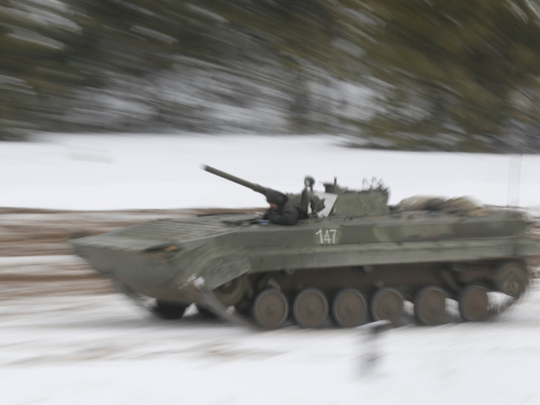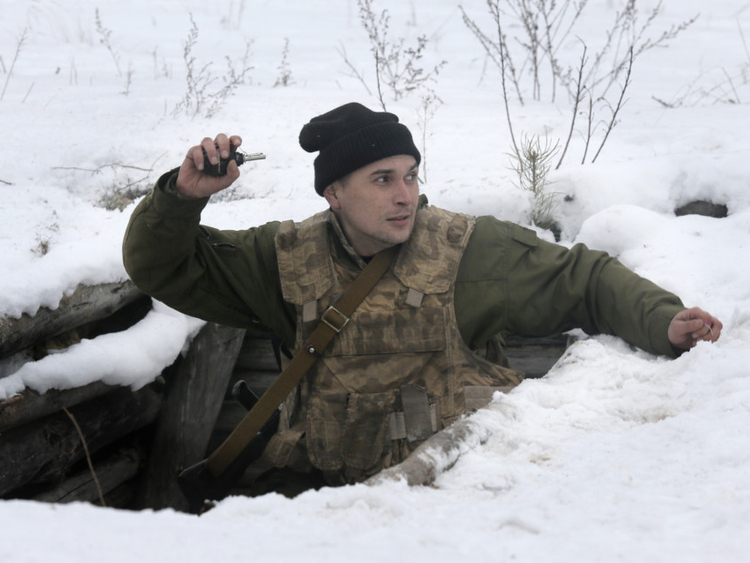
Zaitseve, Ukraine: The pop of corks exploding from beverage bottles briefly replaced the thud of artillery as a unit of soldiers gathered for a warzone wedding in Ukraine’s beleaguered east. Andrey Latonov, 23, had first met medic Anya Fozhikosh, 20, at the arms depot he guarded.
“We fell in love straight away,” said the young groom, clad in combat fatigues. “Life goes on, even in wartime.” Following the nuptials, their commander gave a brief speech, penned the previous night under gunfire and grenades. Anya, in silver shoes and a bridal dress, boarded an open-top jeep with Andrey to be paraded back to their positions in the war-torn village of Zaitseve.
“We’ll have an extreme honeymoon on the front line,” smiled Anya. “We’ve been ordered to have children straight away — we can’t wait until the war ends. We might be waiting forever.”
Across Europe’s only active conflict zone, where government forces have been fighting Russian-backed separatists since 2014, many Ukrainians like Anya now grudgingly accept they are trapped in a static state of war as Moscow covertly applies a policy of perpetual, violent destabilisation on its former Soviet neighbour and the world turns towards other international crises.
Now, with snow and ice gripping this deadlocked eastern front, civilians are bracing themselves for the war’s third winter. Fighting has intensified since a fleeting autumn lull, separatists have ousted one of the last remaining aid organisations, thousands of people risk being cut off from water supplies, and UN aid agencies face multimillion-pound holes.
While a ceasefire in February 2015 dampened the worst hostilities and staunched further offensives, artillery strikes and skirmishes occur daily. This forgotten, futile conflict has claimed 10,000 lives, prompted an exodus of more than two million and devastated infrastructure across Donbas, Ukraine’s impoverished mining region.
The German Foreign Minister, Frank-Walter Steinmeier, in mid-December called for an urgent end to the “recent deterioration” along the front line “for the sake of the civilian population, who are facing the third winter of the conflict”.
Donetsk’s separatist authorities recently expelled the humanitarian group, People in Need (PIN), and sealed off the NGO’s warehouse in a move that risks endangering the most vulnerable as temperatures plunge below -10 Celcius.
PIN has provided food and water to more than half a million civilians and helped a further 138,000 by repairing bombed-out homes. The Red Cross is now the only international aid organisation left in the self-proclaimed Donetsk People’s Republic (DNR).
Simon Panek, director of the Czech-based PIN, warned of a “critical” situation for thousands of civilians this winter and voiced exasperation with the separatists’ decision to “prevent us from delivering assistance to people who are in dire need”. Hundreds of homes will now not receive new windows to replace those shattered by fighting, leaving many to rely on flimsy tarpaulins.
A senior DNR official accused the aid group of committing “a number of violations”. Water shortages are compounding the misery. This crisis could affect the entire country, the UN warns, as sporadic supplies in the east risk a new wave of mass displacement. Heating and water provisions for 600,000 people across the divided Luhansk region are uncertain after a water board’s debts left it unable to pay for electricity to operate pumps. Elsewhere, the use of heavy weapons has repeatedly disrupted water and electricity supplies in homes, hospitals and schools.
In the frontline village of Zaitseve, Lyudmila Pokhumova, 51, runs an unofficial aid centre from her garage. She says her neighbourhood has been without electricity and gas for months. “We try to help our neighbours but there’s only so much we can do. The world must know that war has not stopped in Donbass.”












